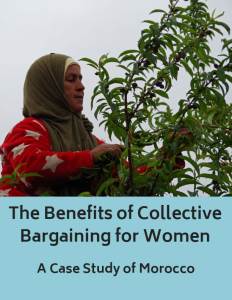The Challenge
Because of illiteracy, discrimination, and patriarchal norms, women’s overall employment rates in Morocco are low, hovering around 25 percent. However, women make up half of Morocco’s rural labor force—typically working in informal, low-paid and precarious agricultural jobs. Although Morocco has a national labor law that sets the minimum wage and maximum hours of work, enforcement is weak. Agricultural workers, both men and women, are often underpaid, denied the benefits to which they are entitled, and forced to work long hours. Women are disproportionately affected by the informal nature of the sector, receiving lower wages than men, even for skill-intensive tasks. They also face the additional threat of gender-based violence in the workplace. While Morocco’s labor code and its constitution explicitly uphold the right to form and join unions, collective bargaining is limited primarily to larger companies and the formal economy.
What’s in the Report
Funded jointly by the Ford Foundation and the United States Agency for International Development, the report examines how agricultural workers, and women workers in particular, benefit from collective bargaining, and how women’s participation influences the outcomes of negotiations. The report’s authors, the International Center for Research on Women (ICRW) and Solidarity Center, an international workers’ rights group, look specifically at a landmark collective bargaining agreement negotiated by the Confédération Démocratique du Travail (CDT) with its employer, Domaines Brahim Zniber Diana Holding Group, in 2015—the first collective bargaining agreement in Morocco’s agricultural sector.
Using a participatory approach, the researchers found that both men and women workers reported a significant improvement in wage security, working conditions and workplace transparency as a result of the collective bargaining agreement. Women’s specific gains were dramatic and included equal pay for equal work; training to qualify for higher-skilled jobs with better wages, previously available only to men; and maternity-related benefits, including three months off after childbirth.
“We benefited from a freedom and independence we didn’t have before the union. The union freed us a lot and increased our dignity.”
A seasonal female farm worker in Morocco
Despite this important progress, the researchers found that women’s full participation in the negotiations and leadership processes is hampered by gendered and restrictive social norms. The report concludes with recommendations to strengthen women’s engagement in the next collective bargaining agreement process, for example, through literacy and rights training. It also highlights areas for future negotiations, such as reducing the workload irregularity and job segmentation that continue to disproportionately impact women as well as infrastructure investments to address the care burdens that women workers shoulder.
